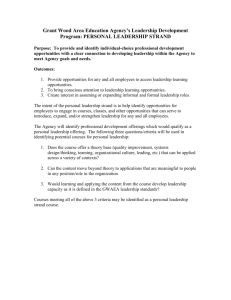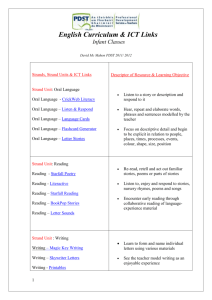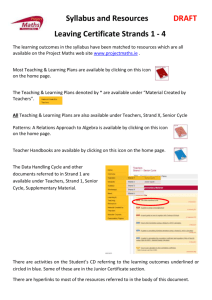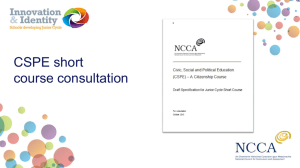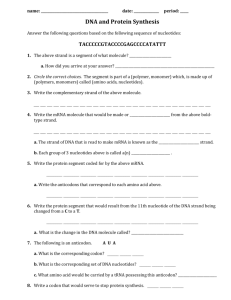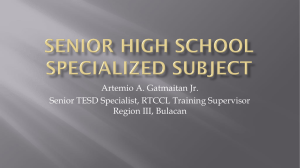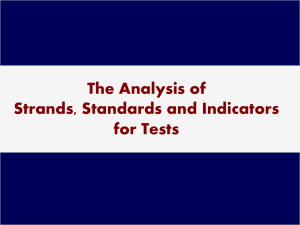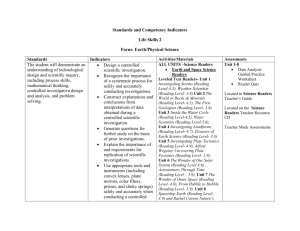FORM-5.5.1_Admin_PC_PGP_v.3
advertisement
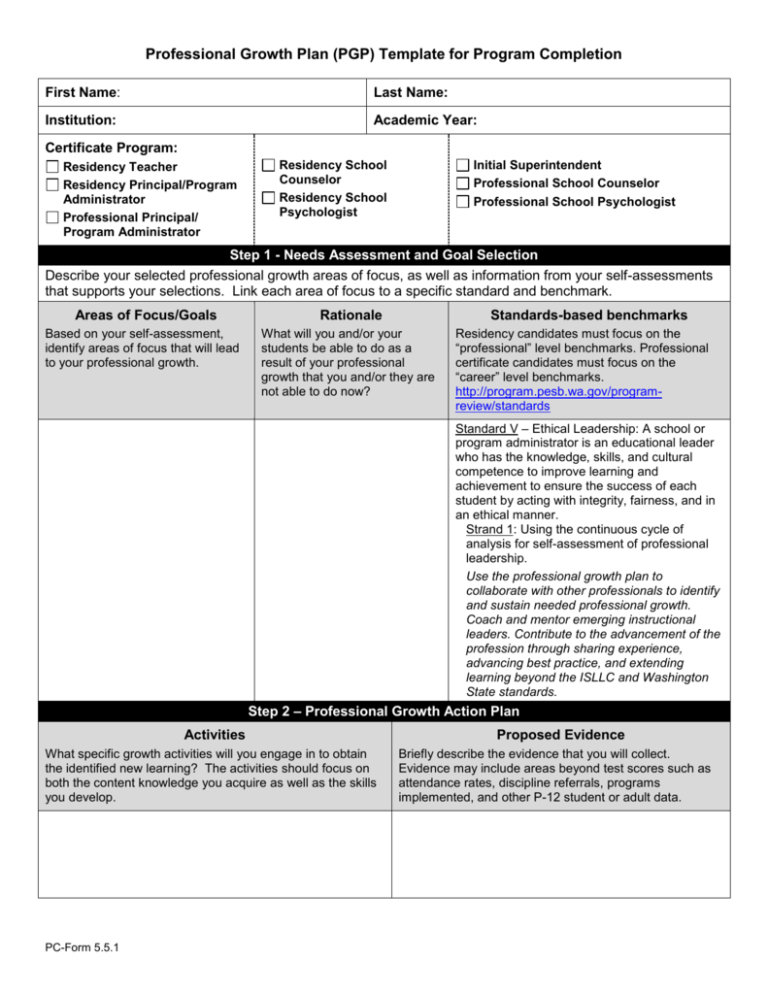
Professional Growth Plan (PGP) Template for Program Completion First Name: Last Name: Institution: Academic Year: Certificate Program: Residency Teacher Residency Principal/Program Administrator Professional Principal/ Program Administrator Residency School Counselor Residency School Psychologist Initial Superintendent Professional School Counselor Professional School Psychologist Step 1 - Needs Assessment and Goal Selection Describe your selected professional growth areas of focus, as well as information from your self-assessments that supports your selections. Link each area of focus to a specific standard and benchmark. Areas of Focus/Goals Based on your self-assessment, identify areas of focus that will lead to your professional growth. Rationale Standards-based benchmarks What will you and/or your students be able to do as a result of your professional growth that you and/or they are not able to do now? Residency candidates must focus on the “professional” level benchmarks. Professional certificate candidates must focus on the “career” level benchmarks. http://program.pesb.wa.gov/programreview/standards Standard V – Ethical Leadership: A school or program administrator is an educational leader who has the knowledge, skills, and cultural competence to improve learning and achievement to ensure the success of each student by acting with integrity, fairness, and in an ethical manner. Strand 1: Using the continuous cycle of analysis for self-assessment of professional leadership. Use the professional growth plan to collaborate with other professionals to identify and sustain needed professional growth. Coach and mentor emerging instructional leaders. Contribute to the advancement of the profession through sharing experience, advancing best practice, and extending learning beyond the ISLLC and Washington State standards. Step 2 – Professional Growth Action Plan Activities What specific growth activities will you engage in to obtain the identified new learning? The activities should focus on both the content knowledge you acquire as well as the skills you develop. PC-Form 5.5.1 Proposed Evidence Briefly describe the evidence that you will collect. Evidence may include areas beyond test scores such as attendance rates, discipline referrals, programs implemented, and other P-12 student or adult data. Step 3 – Review of Plan Candidate Signature (required) Print Name Date Program Signature (required) Print Name Date PC-Form 5.5.1 Attachment 1 Washington Principal/Program Administrator Standards-Based Benchmarks Standard One Visionary Leadership: A school or program administrator is an educational leader who has the knowledge, skills, and cultural competence to improve learning and achievement to ensure the success of each student by leading the development, articulation, implementation, and stewardship of a vision of learning that is shared and supported by school/program and community stakeholders. Strand 1 – Advancing a school- or program-wide shared vision for learning. Career Level- Continually review and restructure the vision to address changing circumstances based on relevant data, including student cultural histories and contexts. Guide others in furthering the vision. Enhance the vision to include cultural competence of the district and region. Strand 2 – Putting the vision for learning into operation. Career Level- Implement the vision across multiple stakeholder groups and settings. Use data to continually monitor and revise systems to reflect the vision. Solicit from and give feedback to other administrators to analyze the effectiveness of the school/program vision in shaping education programs, systems, and resources to positively impact student learning. Strand 3 - Developing stewardship of the vision. Career Level- Continually evaluate alignment between vision and progress toward promoting success of all students within the learning community. Expand base and empower stakeholders to participate in shaping education programs, systems, and resources to move the learning community toward the shared vision of promoting success of all students. Design a system of shared responsibility for renewing the vision, as well as acknowledging and celebrating progress toward the vision. Standard Two Instructional Improvement: A school or program administrator is an educational leader who has the knowledge, skills, and cultural competence to improve learning and achievement to ensure the success of each student by leading through advocating, nurturing, and sustaining district/school/program cultures and coherent instructional programs that are conducive to student learning and staff professional growth. Strand 1 – Advocating, nurturing, and sustaining an effective school/program culture. Career Level- Empower the stakeholders to define, maintain, and monitor the ways in which the school/program specific culture is affecting student learning. Collaborate with other administrators to give and receive feedback on effectiveness of expectations, implementation, respect, and fairness in improving the overall systems and programs reflective of the school or program learning culture. Strand 2 – Advocating, nurturing, and sustaining student learning. Career Level- Facilitate the understanding and implementation of research-based teaching and assessment along with equity pedagogy that empowers students to take ownership of and to monitor their learning processes in every classroom, every day. Build greater capacity for system support for student learning in collaboration with families, stakeholders, and district staff. Strand 3 – Advocating, nurturing, and sustaining coherent, intentional professional development. Career Level- Facilitate systems that focus staff on reflection, collaboration, and peer mentorship to support successful professional development. Build staff leadership in creating and maintaining student-centered achievement goals. Learn from and with peers to gather and interpret data to build greater capacity for professional development support using resources from community stakeholders as well as state-funded initiatives. PC-Form 5.5.1 Standard Three Effective Management: A school or program administrator is an educational leader who has the knowledge, skills, and cultural competence to improve learning and achievement to ensure the success of each student by ensuring management of the organization, operations, and resources for a safe, efficient, and effective learning environment. Strand 1 – Uses a continuous cycle of analysis to ensure efficient and effective systems. Career Level- Create and sustain a culture of continuous analysis in every aspect of the learning community. Coach and mentor emerging staff, student, and community leaders. Collaborate with other administrators and education staff associates to use the continuous cycle of analysis to improve structures, procedures and resources to positively impact student learning through professional development, the family community, and community at large. Strand 2 – Ensuring efficient and effective management of the organization. Career Level- Align organizational elements of the school/program with the School/Program Improvement Plan ensuring an effective and positive learning environment. Develop a school- or program-wide student selfregulation program. Use data to adjust the effective implementation of the school/program safety plan. Seek feedback from and give to other administrators. Share organizational expertise with others and actively mentor other educational leaders. Strand 3 – Ensuring efficient and effective management of the operations. Career Level- Establish a culture where everyone accepts shared responsibility for management operations. Collaborate with all stakeholders to seek and give feedback to improve the effectiveness of management procedures system-wide. Strand 4 – Ensuring management of the resources for a safe, efficient, and effective learning environment. Career Level- Maximize the use of human, fiscal, technological, and material resources based on data analysis and forecasting. Act creatively to support continuous school/program improvement in response to the changing environment. Collaborate with other administrators and stakeholders to increase and distribute available resources equitably for your school/program and district. Standard Four Inclusive Practice: A school or program administrator is an educational leader who has the knowledge, skills, and cultural competence to improve learning and achievement to ensure the success of each student by collaborating with families and community members, responding to diverse community interests and needs, and mobilizing community resources. Strand 1 – Collaborating with families and community members. Career Level- Regularly seek information and respond to families' and stakeholders’ concerns, expectations, and needs. Validate differences in values, opinions, and views, acknowledging that families, stakeholders, and educators have the best interests of the children and community in mind, leading to common goals for providing learning opportunities for all students. Strand 2 – Collaborating with and responding to diverse communities. Career Level- Lead staff in examining the personal, social, and cognitive consequences of policies and practices on equity in the schools/programs. Develop programs that promote mutual respect and understanding among students, staff, families, and all other stakeholders. Work to assure that policies encourage the use of research-based assessments appropriate for individual linguistic and cultural groups. Advocate development and recruitment of a racially, culturally, and ethnically diverse staff. Strand 3 – Mobilizing community resources. Career Level- Develop strategies to ensure that all schools/programs, regardless of their locations in the district, are funded equitably. Advocate state and district level officials to provide additional funding for schools/programs with low-income populations. Develop and maintain effective media relations. Establish PC-Form 5.5.1 mutually beneficial relations with businesses, higher education institutions, agencies, and community groups that support the implementation of the School/Program Improvement Plan. Standard Five Ethical Leadership: A school or program administrator is an educational leader who has the knowledge, skills, and cultural competence to improve learning and achievement to ensure the success of each student by acting with integrity, fairness, and in an ethical manner. Strand 1 – Using the continuous cycle of analysis for self-assessment of professional leadership. Career Level- Use the professional growth plan to collaborate with other professionals to identify and sustain needed professional growth. Coach and mentor emerging instructional leaders. Contribute to the advancement of the profession through sharing experience, advancing best practice, and extending learning beyond the ISLLC and Washington State standards. Strand 2 – Acting with integrity, fairness, and courage in upholding high ethical standards. Career Level-Serve as a role model of fairness, equity, and respect to the educational community and the community at large. Respond to moral dilemmas in a manner that inspires others to demonstrate integrity and exercise ethical behavior. Standard Six Socio-Political Context: A school or program administrator is an educational leader who has the knowledge, skills, and cultural competence to improve learning and achievement to ensure the success of each student by understanding, responding to, and influencing the political, social, economic, legal, and cultural context. Strand 1 – Understanding the role of schools or programs in a democracy. Career Level- Promote student civic involvement which prepares them for active participation in a democratic and global society. Actively participate in influencing the quality of a democratic education beyond the local levy (e.g., state and federal policy and legislation, professional associations, share knowledge and experience through workshops and written work, or mentor fellow educators through a continuing dialogue around educational issues). Empower others to create school- or program-based accountability models using the continuous cycle of analysis that goes beyond state standards for improvement of student learning. PC-Form 5.5.1
